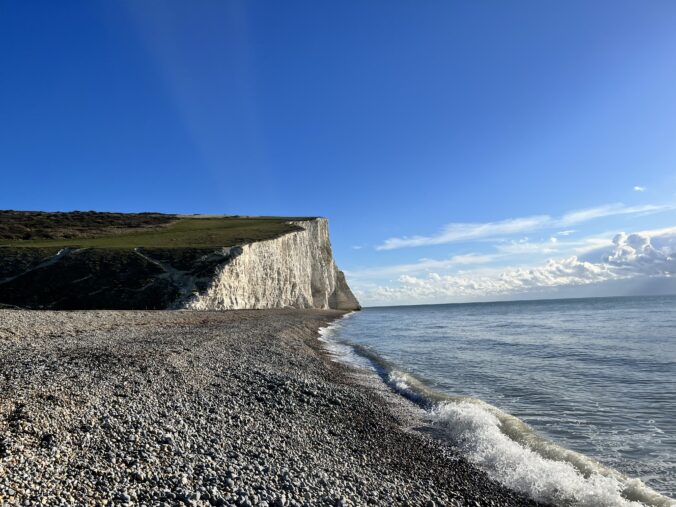Matthew Arnold wrote his famous poem “Dover Beach” likely around the late 1840s. It has strong elements of romanticism:
The sea is calm tonight.
The tide is full, the moon lies fair
Upon the straits; on the French coast the light
Gleams and is gone; the cliffs of England stand,
Glimmering and vast, out in the tranquil bay.
Come to the window, sweet is the night-air!
yet this is soon followed by sadness.
Only, from the long line of spray
Where the sea meets the moon-blanched land,
Listen! you hear the grating roar
Of pebbles which the waves draw back, and fling,
At their return, up the high strand,
Begin, and cease, and then again begin,
With tremulous cadence slow, and bring
The eternal note of sadness in.
Hope, light, and sweet night air
are carried by notes of despair
And all this in a Victorian time of faith in technological progress. The Great Exhibition in Paris would open its doors in 1851, showing the world the Things To Come: Leech-using barometers (no, really — have a look), photography, pay toilets, firearms…
Ah yes, firearms. There might have been some rumblings in Europe, but weren’t there always? It wouldn’t be until 1884 before Hiram Maxim would develop the first firearm that combined the words “machine” and “gun”.
In 1882 I was in Vienna, where I met an American whom I had known in the States. He said: “Hang your chemistry and electricity! If you want to make a pile of money, invent something that will enable these Europeans to cut each others’ throats with greater facility.”
Hiram Maxim
Arnold continues:
Sophocles long ago
Heard it on the Ægean, and it brought
Into his mind the turbid ebb and flow
Of human misery; we
Find also in the sound a thought,
Hearing it by this distant northern sea.
Sophocles. That playwright who makes the Antigone chorus cry:
Happy are they whose time has not tasted disaster.
Sophocles’ Antigone (excerpt) translated by Robin Bond
For a house that is shaken by gods, there the curse
fails not at all, but floods each generation in turn:
just so the swell and the surge, pushed hard by grim
blasts of storm winds from Thrace, scouring the crests
of the deep, darkling sea, stirs up the black silted sands,
beneath where the wracked and abutting cliffs resound.
Moving the poem’s theme of sea and beach along on the “turbid ebb and flow of human misery”, there follows a melancholic yearning for when the Sea of Faith was as full as that distant northern sea.
The Sea of Faith
Was once, too, at the full, and round earth’s shore
Lay like the folds of a bright girdle furled.
But now I only hear
Its melancholy, long, withdrawing roar,
Retreating, to the breath
Of the night-wind, down the vast edges drear
And naked shingles of the world.
Arnold, though an atheist, still seems to yearn for that faith that he has found wanting and ebbing. Those “naked shingles of the world” without faith remind me of the madman’s speech which Nietzsche’s would write some years later in The Gay Science:
Is there still any up or down? Are we not straying, as through an infinite nothing?
Friedrich Nietzsche, the gay science (1882, excerpt)
Do we not feel the breath of empty space?
Has it not become colder?
Is not night continually closing in on us?
Do we not need to light lanterns in the morning?
Feeling this breath of empty space, this retreating roar of the surf on so many pebbles, the naked shingles of the world, Arnold lunges for a stronghold:
Ah, love, let us be true
To one another! for the world, which seems
To lie before us like a land of dreams,
So various, so beautiful, so new,
Hath really neither joy, nor love, nor light,
Nor certitude, nor peace, nor help for pain;
And we are here as on a darkling plain
Swept with confused alarms of struggle and flight,
Where ignorant armies clash by night.
The existential conclusion attempts to harness love as that which can move us from having to face the naked shingles of the world. Even though this world “hath really neither joy, not love, not light, not certitude, nor peace, nor help for pain”.
I can’t help but find the poem prophetic at times. Arnold writes full of romanticism, existential dread and despair during a time of great optimism in progress. Yet his ignorant armies clashing by night would eventually clash in that Great War. That same war that would have Wilfred Owen produce this other great poem, yet take his life all the same.
If you could hear, at every jolt, the blood
Wilfred Owen, “Dulce et decorum est” (excerpt, written during WW1),
Come gargling from the froth-corrupted lungs,
Obscene as cancer,
Bitter as the cud
Of vile, incurable sores on innocent tongues,–
My friend, you would not tell with such high zest
To children ardent for some desperate glory,
The old Lie: Dulce et decorum est
Pro patria mori.

Leave a Reply
You must be logged in to post a comment.